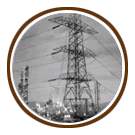 |
|||||||
| Electric Deregulation:
In January of 2002, Texas will launch a bold experiment when the state allows consumers to choose power generation suppliers. How much will deregulation affect electric rates? For consumers, the most immediate concern about deregulation is how it will affect their power bill. Advocates of deregulation predict it will reduce retail electric rates. Unfortunately, rates probably won’t drop as much as consumers may have been led to expect. In fact, deregulation of other industries such as telecommunications has led to higher total bills. Anatomy of an electric bill The three parts of your electric bill are generation, transmission and distribution. Electric deregulation changes how power generation will be bought and sold. It does not change how power will be transmitted or distributed. GENERATION is the actual production of electric power, whether by hydroelectric dams, coal or natural gas fired plants, nuclear power plants, wind turbines, solar cells or other means. Most power in West Texas is produced by natural gas, coal and oil.
DISTRIBUTION is the process of getting power to the consumer. This is the network of lines that connects the transmission delivery point (such as a substation) to homes, stores, offices, factories – anyone that buys retail electricity. Co-ops only distribute electricity There are seventy -five electric co-ops in Texas. Most of them only distribute electricity. (Another eleven Texas co-ops generate and transmit electricity, but they only wholesale electricity to distribution co-ops.) What deregulation will do Deregulation affects only power generation (not transmission or distribution). Currently, many utilities—private and public—not only distribute power, but generate and transmit it as well. Deregulation will require these companies to separate those parts of their businesses that supply power. Will deregulation benefit consumers? In theory, deregulation should lower electric rates. Whether this will actually happen remains to be seen. Other states have had mixed results with electric deregulation. For that matter, other industries, such as airlines and telecommunications, have undergone deregulation with results that have not always benefited consumers. Deregulation is an experiment whose ultimate outcome cannot yet be confidently predicted. Why co-ops have a choice in deregulation When the Texas Legislature approved electric restructuring in 1999, it exempted cooperatives and municipally-owned systems. Why? Because these services are owned by their customers and run on a democratic business model. Co-op members, for instance, elect their board of directors, which in turn set co-op policy. "Opting in" is forever There is no deadline for co-ops to "opt in," but—and this is important—if a co-op decides to become deregulated, the decision is virtually permanent. Opting "out" again is not a viable choice.
Regardless of whether your co-op ultimately opts in or out of deregulation, it will remain your power distributor. If it becomes deregulated and buys power at market prices, the generation part of your bill will reflect the higher or lower cost, but the other parts of your bill—transmission and distribution—will be unaffected. Not until we’re sure it’s right Generations of Texas schoolchildren have memorized the motto of Davy Crockett, defender of the Alamo: "Be sure you’re right, then go ahead." That wisdom is as apt today as it was in 1836. And if deregulation is right for our members, we intend to go ahead. |
|||||||
 |
|||||||
 |
|||||||
|
site design by |
|||||||
 What It Means to Texas Consumers
What It Means to Texas Consumers TRANSMISSION is the process of moving power from the point of generation (a power plant, for instance) to the point of distribution (called a substation). This is done by high-voltage transmission lines carrying huge amounts of electricity, sometimes as much as 400,000 volts. Compared to the millions of miles of distribution lines, transmission lines are relatively short.
TRANSMISSION is the process of moving power from the point of generation (a power plant, for instance) to the point of distribution (called a substation). This is done by high-voltage transmission lines carrying huge amounts of electricity, sometimes as much as 400,000 volts. Compared to the millions of miles of distribution lines, transmission lines are relatively short. Why we want to "wait and see"
Why we want to "wait and see"